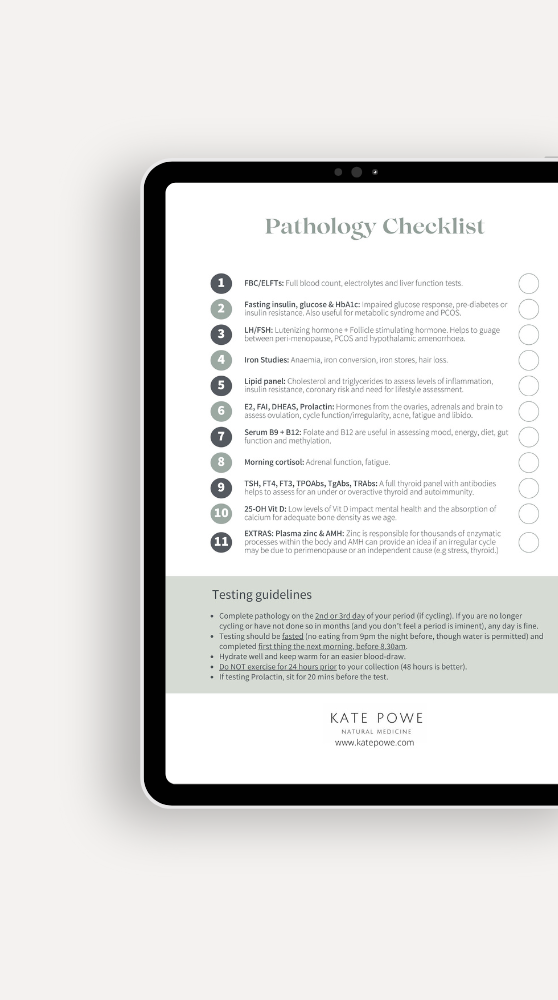If you’ve been enduring fatigue, heavy periods and the fear of flooding for far too long, it’s time you investigated what your body is trying to tell you.
Heavy periods – How heavy is too heavy?
Menorrhagia, a fancy term for heavy periods, is defined by a blood loss of more than 80 mls across your period. As Lara Briden explains in her book The Period Repair Manual, 80 mls equates to 16 fully soaked regular tampons or 8 fully soaked super tampons over your entire period. So if you’re changing your super tampon every 1-2 hours and/or wearing double protection of a pad with a cup or tampon and still feeling unsafe, your flow is heavy!
Why do I have heavy periods?
There are a number of reasons that should be investigated further. Some of the most common reasons are below:
- High relative oestrogen to progesterone
As we’ve seen in my passion for progesterone article, oestrogen likes to stimulate and plump up your uterine lining whilst progesterone helps counter its proliferative activity. When oestrogen is high (which can happen with poor liver and bowel clearance, PCOS, anovulatory cycles, excess environment toxins and xenoestrogens entering into our bodies) this stimulation of the endometrial lining can go unchecked leading to a heavy flow. - Endometriosis, adenomyosis, polyps or fibroids
Each of these conditions is associated with, and driven by, the stimulation of oestrogen on certain tissues, whether that’s within the pelvic cavity (endometriosis), the muscle wall of the uterus (adenomyosis or fibroids) or the uterus itself (polyps/fibroids). Typically fibroids are correlated more with pain as they grown in the uterine muscle wall, which can impact on the ability of the uterus to contract. However they may be associated with heavy bleeding if present within the uterine cavity itself. - Low iron
The catch-22. Lose blood, lose iron. Lose iron, lose more blood. So we definitely don’t want to let heavy bleeding continue and induce iron deficiency anaemia. - Peri-menopause
Peri-menopause can be a rollercoaster for periods and the surge in hormones, along with reduced progesterone, can lead to debilitating flow, even flooding. - Hypothyroidism
Low thyroid function can also be a cause of fatigue, hair loss, weight gain, low energy and heavy periods. - Clotting factor disorders
Often missed, but if you’re had heavy periods all your life you may have a genetic problem with one or more of the genes responsible for your ability to clot and stem blood flow. It may be worth asking your medical practitioner to consider blood coagulation tests. On the flip side, if you have already been referred on to a haematologist, you may have been prescribed a drug called Cyklokapron or Lysteda (tranexamic acid), which slows the breakdown of clots, reducing a heavy flow. If there is any immediate personal or family history of stroke or thromboembolism, or you are on hormonal birth control, please mention this to your practitioner as this may impact the suitability of this option for you. - The hormonal or copper IUD
Whist for some women, the hormonal IUD like Mirena lightens flow, in other women it can cause heavy bleeding, typically in the first 6 months of placement. The copper IUD, whilst effective as a contraceptive device and a good non-hormonal option, does often increase blood flow and may not be suitable if you’re already battling menorrhagia.
What Do I Do For Heavy Periods?
Pathology to consider
- Iron studies: In particular, ferritin.
- Thyroid function test: In reality, this is unlikely to be covered by Medicare for those in Australia. To pay as an out of pocket expense, the test is around $45
- Further investigations: Once discussed with your GP or healthcare practitioner, potentially further investigations such as hormone tests, coagulation studies, a pelvic ultrasound or hysteroscopy/laparoscopy to rule out: fibroids, polyps, endometriosis, adenomyosis, thyroid disease, clotting disorders or peri-menopause
Preventative treatments to try right now
- Avoid dairy: Lara Briden suggests dairy makes periods heavier. Try avoiding cow dairy for 6-8 weeks and see if there is an impact.
- Include iron-rich foods such as animal protein and/or Vitamin C foods with non-haem sources of iron (i.e. plant based sources) to increase iron absorption.
- Curcumin: The active constituent in turmeric, curcumin, is a great anti-inflammatory and can reduce both blood flow and period pain. Take in capsule or liposomal form throughout your entire cycle.
- Herbal medicines: While you’re investigating the cause, a herbal styptic may be useful in reducing a heavy flow. Herbs such as Panax notoginseng (Tienchi ginseng) or Capsella bursa-pastoris (Shepherd’s purse) under professional guidance can help.
- Progesterone: If your heavy flow is hormonally-driven, bio identical progesterone may be an option to lighten flow, especially in peri-menopause.
- Medications: Not ideal but in emergency situations, taking a medication may be an option until the underlying cause is uncovered and addressed. Ibuprofen and Tranexamic acid can reduce flow significantly.
Kate is a qualified naturopath who is passionate about helping women heal from hormonal havoc and inspiring women to know their own power, worth and wisdom.
Kate offers one-on-one Skype consults for irregular cycles, PMS and period pain, endometriosis, PCOS, peri-menopause, mood swings, fatigue and mental and emotional stress.
Simply drop me an email to see how I can help you!






